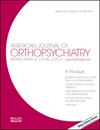The drive for muscularity and disordered eating among heterosexual and sexual minority men in Israel.
IF 2.3
3区 医学
Q1 SOCIAL WORK
引用次数: 0
Abstract
In this study, we investigated the moderating effects of self-acceptance and perceived country-level acceptance of gender and sexual orientation on the relationship between the drive for muscularity and disordered eating, particularly among sexual minority and cisgender men. We hypothesized that high levels of acceptance, both individually and within the societal context, would mitigate the pressure to adhere to conventional masculine ideals, consequently lowering the likelihood of engaging in disordered eating behaviors. Seven hundred twenty-three Israeli men aged 18-68 participated in the study. The sample included heterosexual men (67.9%) and sexual minority men (30.1%), with a deliberate oversampling of sexual minority men to explore differences in the suggested model between heterosexual and sexual minority groups. The data were analyzed using hierarchical robust regression, examining interactions between the variables of interest. The results revealed significant associations between the drive for muscularity, disordered eating, and lower self-acceptance of sexual identity. Sexual minority men reported higher levels of disordered eating and drive for muscularity than did heterosexual men, along with lower levels of acceptance of gender and sexual orientation (by the individual and the country). The association between drive for muscularity and disordered eating was moderated by sexual orientation and self-acceptance of gender identity, with a stronger association among men with lower self-acceptance of their gender identity and sexual minority men. The findings underscore the significance of fostering individual and country-level acceptance of gender and sexual orientation differences to promote well-being and mitigate the risk of disordered eating among heterosexual and sexual minority men, particularly the latter. (PsycInfo Database Record (c) 2024 APA, all rights reserved).以色列异性恋和性少数群体男性对肌肉的追求和饮食失调。
在这项研究中,我们调查了自我接纳以及国家层面对性别和性取向的认知接纳对肌肉发达与饮食失调之间关系的调节作用,尤其是在性少数群体和顺性别男性中。我们假设,无论是个人还是社会背景下的高接受度都会减轻坚持传统男性理想的压力,从而降低出现饮食失调行为的可能性。723 名年龄在 18-68 岁之间的以色列男性参与了这项研究。样本包括异性恋男性(67.9%)和性少数群体男性(30.1%),特意对性少数群体男性进行了超额抽样,以探索异性恋群体和性少数群体之间建议模式的差异。采用分层稳健回归法对数据进行了分析,研究了相关变量之间的交互作用。结果显示,肌肉发达的驱动力、饮食失调和对性身份的自我认同感较低之间存在明显关联。与异性恋男性相比,性少数群体男性的饮食失调和肌肉发达驱动力水平较高,同时(个人和国家)对性别和性取向的接受程度较低。性取向和对性别认同的自我接纳程度会调节肌肉发达与饮食失调之间的关系,自我接纳性别认同程度较低的男性和性少数群体男性之间的关系更为密切。研究结果强调,促进个人和国家层面对性别和性取向差异的接受,对于促进异性恋和性少数群体男性(尤其是后者)的幸福感和降低饮食失调的风险具有重要意义。(PsycInfo Database Record (c) 2024 APA,保留所有权利)。
本文章由计算机程序翻译,如有差异,请以英文原文为准。
求助全文
约1分钟内获得全文
求助全文
来源期刊
CiteScore
5.70
自引率
3.00%
发文量
74
审稿时长
6-12 weeks
期刊介绍:
The American Journal of Orthopsychiatry publishes articles that clarify, challenge, or reshape the prevailing understanding of factors in the prevention and correction of injustice and in the sustainable development of a humane and just society.

 求助内容:
求助内容: 应助结果提醒方式:
应助结果提醒方式:


